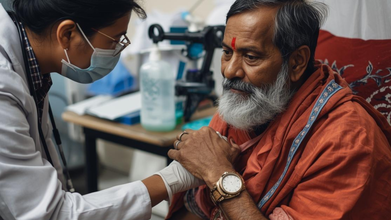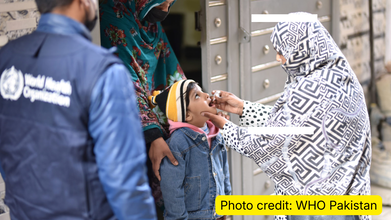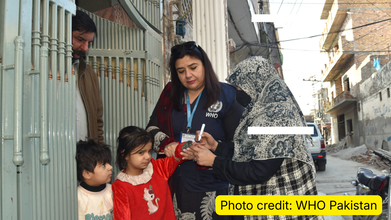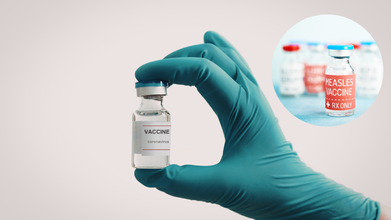- Health Conditions A-Z
- Health & Wellness
- Nutrition
- Fitness
- Health News
- Ayurveda
- Videos
- Medicine A-Z
- Parenting
Daughter Of Kate Shemirani Passes Away From Cancer At 23, Son Says She Fell For Anti-vaxxer 'Mum's Conspiracy Theories'

Credits: Kate Shemirani, Facebook & Mediscape UK
Kate Shemirani: "My sister has passed away as a direct consequence of my mum's actions and beliefs and I don't want anyone else to go through the same pain or loss that I have," said Sebastian, son of anti-vaxxer and a British conspiracy theorist Kate Shemirani, whose daughter passed away from cancer at the age of 23.
Sebastian blames his mother and her beliefs to have influencing his sister into not taking proper cancer treatment. Kate, now an anti-vaccine activist and former nurse, had lost her license to practice in 2020 for misconduct and is best known for promoting conspiracy theories about COVID-19 vaccinations and 5G technology.
Her daughter, Paloma Shemirani passed away last July from a type of blood cancer when she was only 23. As per her brother's claim, it is the mother who is to be blamed. However, Kate and her husband wrote to the BBC, claiming that they have evidence against the NHS for her daughter's death. The BBC reports: "'Paloma died as a result of medical interventions given without confirmed diagnosis or lawful consent'. The BBC has seen no evidence to substantiate these claims."
Her brothers, Gabriel and Sebastian, allege that Paloma ultimately declined conventional chemotherapy, despite doctors giving her an 80% chance of survival, due to pressure from their mother, with whom she was trying to rebuild a strained relationship.
They further claim their mother deliberately isolated Paloma from her friends, boyfriend, and extended family, even as her cancer visibly worsened. Paloma, a Cambridge graduate who once celebrated top exam results with a bright smile, had dreamed of a career in publishing.
But her life, her brothers say, was tragically cut short under the undue influence of their mother, who gained notoriety during the pandemic.
What Happened To Paloma?
In 2023, when Paloma was diagnosed with cancer, doctors informed her she had an 80% chance of recovery if she underwent chemotherapy. But her mother, as reported by the Daily Mail, strongly opposed the treatment.
In a message sent in all capital letters to Paloma’s boyfriend, she warned:
“TELL PALOMA NOT TO SIGN IR (sic) VERBALLY CONSENT TO CHEMO OR ANY TREATMENT.”
Despite medical advice and growing concerns about her mother’s influence, Paloma declined chemotherapy. Instead, she turned to one of Kate’s former partners, who encouraged her to consider Gerson therapy, a debunked alternative treatment that promotes a strict plant-based diet and coffee enemas as a cure for cancer, which Kate, too, has claimed, helped in curing her breast cancer.
Cancer Research UK states there is “no scientific evidence” supporting Gerson therapy as an effective cancer treatment. The charity notes that while some people turn to it in search of control over their illness, no credible clinical studies support its use, and existing research is often biased or funded by pro-alternative medicine groups.
Kate’s former partner told the BBC that:
“any assertions that I played a role in her death are legally inaccurate.”
As Paloma pursued this alternative path, friends began to notice her condition deteriorating, as reported in the Daily Mail. New lumps were appearing, and her cancer was visibly spreading. She reportedly distanced herself from anyone who questioned her treatment decisions.
Her school friend Chantelle shared, “I don’t think her ideology was strong enough to make those decisions. People have different opinions, but I believe her mum played a massive, massive role in it.”
Gabriel, one of Paloma’s brothers, attempted to visit her but was told she couldn’t go outside due to “bad air.” He initiated legal proceedings to have her properly medically evaluated, but the case never moved forward. Paloma died in July 2024 after suffering a heart attack caused by her tumor. She was taken off life support after several days in the hospital.
Gabriel only learned of her death days later through his lawyer and had to inform their brother, Sebastian.
An inquest into Paloma’s death is scheduled to begin next month.
Who Is Kate?
Now 60, she calls herself a 'natural nurse', even though she has been banned from practicing nursing in the UK. She also made headlines during the pandemic when she used her social media account to claim that COVID-19 vaccines had a 'tiny bit of Satan' inside, and claims like the jabs caused cancer and contained material harvested from aborted fetuses.
She also claimed that the COVID-19 virus was connected to the rollout of 5G technology and described it as a political tool designed to alter people’s DNA. She compared lockdowns to the Holocaust, declared that NHS nurses seen dancing would one day “stand trial for genocide,” and labelled vaccination teams as “death squads.”
As of now, she has not commented on her sons' claims.
Cancer, Cause And Cure, And Unscientific Claims
Sebastian has previously described his childhood as “hell,” claiming he was subjected to years of brainwashing. He recalled being terrified at age 10 when Shemirani told him that "the Rothschilds plan to live on a space station" and that a mass genocide was imminent.
In 2012, Kate was diagnosed with breast cancer and underwent surgery, including a double mastectomy and reconstruction. However, online she attributed her recovery not to medical treatment, but to ‘Gerson therapy’—a debunked alternative approach promoting a strict plant-based diet, alongside vitamin and mistletoe injections.
"I'm still here and thriving. You can shove your poison mustard gas where the sun doesn't shine, you pimps and assassins," she posted on X earlier this year, referring to chemotherapy.
According to Chantelle, as reported by Daily Mail, a school friend of Paloma’s, Kate’s belief that conventional medicine had failed only deepened after her recovery. She recounted watching Paloma get sunburned because she refused to wear sunscreen, believing it, not sun exposure, caused cancer.
While Gabriel and Sebastian are now estranged from their mother, Paloma maintained contact, seemingly in an effort to repair their relationship. Like her mother, she also declined the COVID-19 vaccine.
Andhra Pradesh Partners With Gates Foundation to Transform Healthcare System

Andhra Pradesh Health Minister Satya Kumar Yadav has announced a collaboration with the Gates Foundation to provide universal access to modern and affordable healthcare to its residents.
In alignment with Chief Minister Nara Chandrababu Naidu’s vision for ‘Healthy Andhra Pradesh', Yadav announced that the changes will make medical services more accessible and technologically advanced.
He also noted that the partnership will improve nutritional food security and public health outcomes, shift treatment planning from reactive to preventive and focus on a predictive healthcare approach. It also focuses on nutrition programs and digital medical services, moving beyond traditional treatment models.
Yadav further added that the government plans to introduce early disease detection systems, personalized health profiling, advance warning mechanisms for potential illnesses, individual health cards and expanded digital health services, including telemedicine.
The Health Minister assured residents that the State has created a high-power expert advisory group comprising of 10 international experts to review existing healthcare systems and recommend reforms, based on the Foundation's suggestion. Three sub-committees are also being formed to focus on specific areas, he added.
What Role Will AI Play In These Reforms?
In a February 15 statement, Yadav announced the launch of ‘MedTech Challenge’ to identify and demonstrate portable, affordable and scalable medical technologies using AI.“Around 100 applicants participated and, after two rounds of screening, 20 were shortlisted, he said. The shortlisted technologies are currently being tested in government hospitals under a pilot program and a final winner will be decided by the end of March.
Yadav explained that the program's focus areas included AI-based diagnostic tests, portable point-of-care testing centres, smart monitoring and wearable devices, telemedicine tools for remote areas and data integration and disease surveillance.
He said health data collected from various sources will be integrated with the RTGS “Aware” platform to enable early detection of disease outbreaks and data-driven policy formulation, which will help the state go-through with its planned reforms.
Andhra Pradesh Plans To Ban Social Media For Teenagers
The state also recently announced that it may soon follow Australia's steps and ban social media for teenagers under the age of 16 in the state.Nara Lokesh, Information Technology, Electronics and Communications, Real Time Governance and Human Resources Development Minister for Andhra Pradesh, told Bloomberg at the World Economic Forum 2026 Annual Meeting in Davos, Switzerland: "As a state, we are studying Australia’s under-16 law, and yes, I believe we need to create a strong legal enactment.
READ MORE:Living in High-Rises Linked to Higher Air Pollution Exposure, IIT Delhi Study Finds
"Youngsters below a certain age should not be on such platforms, as they do not fully understand the content they are exposed to. Thus, a strong legal framework may be required."
TDP national spokesperson Deepak Reddy supported Lokesh's claim and stated: "Children below a certain age are not emotionally mature enough to comprehend the negative and harmful content that is freely available online. That is why the Andhra government is studying global best practices and examining Australia's under-16 social media law."
If implemented successfully, Andhra Pradesh would be the first Indian state to issue the ban and could pave the way for other states to consider such policies. State officials are yet to clarify when the rule will be implemented and if any fines will be attached to it.
400K WHO-Trained Polio Workers Mobilized To Vaccinate 45 Million Children In Pakistan

Credits: WHO
One of the world's largest public health campaigns against polio has been launched for Pakistan, where around 400,000 World Health Organization or WHO-trained frontline workers have been mobilized to vaccinate 45 million children. This is the country's first nationwide polio campaign of 2026. This is in collaboration with Polio Eradication Initiative, these frontline workers are going door to door across cities and remote settlements, carrying oral drops that is the only protection against a virus which has no cure. Polio. It can even cause life long paralysis.
With over three decades of effort, polio cases in Pakistan reduced by 99.8 per cent, from roughly 20,000 cases in the early 1990s to 31 causes in 2025. The country along with Afghanistan, remains among the last places where wild poliovirus still circulates. This makes this campaign even more critical to global eradication of polio.
Read: Pakistan And Afghanistan Are The Only Countries Where Polio Remains An Endemic, Says WHO
Frontline Workers Reach The Remotest Of Settlements

“We climb mountains and walk through the snow for hours with great difficulty. There is also a risk of snow falling on us from the mountains. Yet we do not give up. We reach our assigned area to vaccinate all children and protect them from polio,” said Rabia, a vaccinator from Upper Chitral, quoted by the Polio Eradication Initiative.
During the February drive, Rabia trekked steep terrain to visit 146 households and vaccinate 85 children in remote areas.
In nearby Booni, another worker, Momina, described the work as both service and responsibility. “I thank Allah that I have gotten this opportunity to serve and I am trying my best to eradicate polio in my country,” she said, according to the initiative.
Zeenat, deployed in Khayaban-e-Sir Syed, spent long days navigating crowded neighbourhoods and climbing multiple floors to reach children inside apartment buildings. She covered 242 homes, administering oral vaccine drops to every eligible child.
“I am a mother too and I have also gotten my own children vaccinated for polio. Thank God, they are healthy and protected now,” she said in remarks shared by the Polio Eradication Initiative. “This disease has no cure. I want all parents in the country to vaccinate their children with polio drops so they don’t fall prey to paralysis.”
Health workers also marked children’s fingers after vaccination, a standard monitoring method to ensure no child is missed.
Two Drops, One Goal: Ending Polio
“The vaccine is very important for children in Pakistan because polio can infect children and paralyze them. This is why we go house-to-house to vaccinate them so that no child is paralyzed,” said Rawalpindi worker Neelum, as reported by the outlet.
Health authorities say the campaign reflects a simple but urgent public-health truth: eradication depends not just on vaccines, but on reaching every last child.
What Is Polio?
It is an illness caused by a virus that affects nerves in the spinal cord or brain stem. It can lead to a person being unable to move certain limbs, which can also lead to paralysis. Furthermore, it can also cause trouble breathing, and lead to death.
The polio virus is a naturally occurring virus that has been around since prehistoric times, as per the WHO. This disease can be found in humans and is spread through the faecal-oral route, which means it is transmitted when someone ingests food or water contaminated by human faeces.
Poliovirus is a small, single-stranded RNA virus that belongs to the Enterovirus subgroup of the Picornaviridae family and was first recognized as a distinct condition by English physician Michael Underwood in 1789. The virus was identified in 1909 by Austrian immunologist Karl Landsteiner.
About 5% of people with poliovirus get a mild version of the disease called abortive poliomyelitis. It has flu-like symptoms and can last for 2 to 3 days. The symptoms include:
Fever
Headache
Muscle Aches
Sore Throat
Stomachache
Loss of appetite
Nausea
Vomiting
A more severe form is the nonparalytic polio, affecting 1% of those infected which may have the symptoms such as:
Neck pain or stiffness
Aches or stiffness in arms or legs
Severe headache
The most serious form is paralytic polio, while the symptoms start with those of nonparalytic polio and can progress to more severe signs including:
Intense pain
Extreme sensitivity to touch
Tingling or pricking sensations
Muscles spasms or twitching
Muscle weakness progressing to a limp paralysis
Measles Outbreak In UK: NHS Is Failing To Vaccinate Children, Warn Experts

Credits: Canva
Measles Outbreak In UK: After 34 children were infected by a "fast spreading" measles outbreak in several north London schools, in Enfield, focus has been shifted on vaccination drive. A local doctor who was reported by the BBC informed that all children who contracted the illness were not fully immunized. This has brought back the attention on vaccination. Children across England are increasingly at risk of measles as immunization coverage drops, prompting MPs and health experts to demand urgent reform of how vaccines are delivered.
Read: North London Measles Outbreak: 34 Cases Confirmed In Unvaccinated Children From Enfield
Measles Outbreak In UK: Falling Uptake Sparks Calls Of Vaccination System Overhaul
According to The Guardian, concerns intensified after vaccination rates in some areas fell to levels comparable with lower-income countries. Public health specialists now believe further outbreaks similar to the recent north London cluster are inevitable because fewer than 60% of five-year-olds in some locations have received both recommended doses of the MMR vaccine.
In Enfield, where 60 children recently contracted measles and 15 required hospitalization, the MMR uptake stands at 64.3%. The World Health Organization recommends 95% coverage to prevent outbreaks.
Measles Outbreak In UK: "System Is Clearly Falling"
Labor MP Ben Coleman warned the current approach relying mainly on GP surgeries and schools is not sufficient.
“The long-term decline in uptake of MMR and growing number of very worrying measles outbreaks, like the one in Enfield just now, show that that system is clearly failing,” he told The Guardian.
“Children are at risk of hospitalization and even of dying from measles… Pharmacies are somewhere families often visit and they’re being wasted as a resource. We can’t afford complacency.”
Experts are urging authorities to allow pharmacies to administer routine childhood vaccinations to improve access. Currently, GP staff typically deliver the first and second doses at 12 and 18 months, while schools host catch-up drives.
Measles Outbreak In UK: Doctors Back Pharmacies Administering Vaccines
Pediatric specialists believe widening access could help families who miss appointments.
“With appropriate training and support, enabling pharmacists to deliver MMR vaccines could be particularly helpful for families who have missed routine appointments,” Prof Steve Turner, president of the Royal College of Paediatrics and Child Health, told The Guardian.
The National Pharmacy Association also supported reform, stating that the decade-long decline shows “the current system is simply not working.”
Vaccination expert Prof Helen Bedford added that some schools, including certain faith schools, do not participate in catch-up programmes, making alternative access points essential.
Measles Outbreaks Are Likely To Recur
Scientists warn measles spreads rapidly in communities with low coverage.
Prof Andrew Pollard of the Oxford Vaccine Group said there was “a real risk of further spread both locally and in other parts of London,” telling The Guardian outbreaks may repeatedly return as unvaccinated children accumulate.
A government spokesperson urged families to vaccinate children promptly and noted a new campaign encouraging parents to ensure routine immunisations are up to date. Officials say childhood vaccines prevent roughly 5,000 deaths and 228,000 hospitalizations each year in England.
© 2024 Bennett, Coleman & Company Limited

